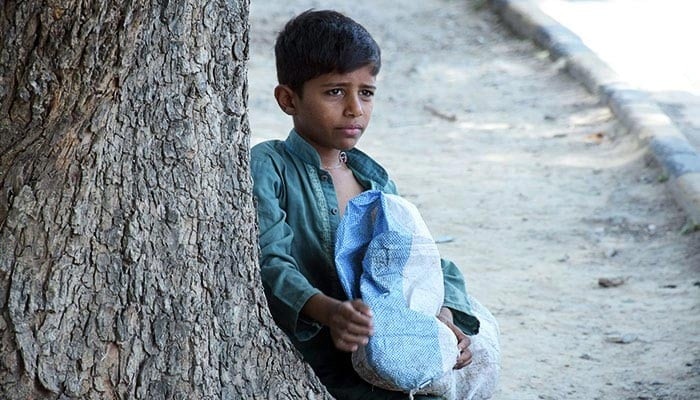Millions of children in Sindh’s backward areas are deprived of education: SHC
The Sindh High Court has observed that the education department has miserably failed to provide primary to higher secondary education to children of the province as millions of children from backward areas are deprived of the opportunity to avail education due to unavailability of teachers and lack of school building infrastructure.
Issuing a judgment on a petition against the closure of government schools in the province, a division bench headed by Justice Salahuddin Panhwar observed that the report filed before the court revealed that a large number of schools are closed due to unavailability of teachers or lack of building or infrastructure despite the fact that “students are there who need education”.
The court observed that the report further revealed that a large number of schools are shelter-less and functioning in damaged buildings, and nothing has been explained as to why these schools are in such a dilapidated condition and not being repaired despite the release of billions of rupees under the head of maintenance and repair of schools.
“The education department does not care at all about this serious issue and the education department is responsible for failure to provide primary education to the children/students, which is their fundamental right enshrined under the Constitution of Islamic Republic of Pakistan,” the court observed in its order.
It further said that several orders have been issued for streamlining the education system in the province and the secretary education has been directed to ensure compliance with verdicts issued constantly by the courts; besides, ensuring accountability of those individuals responsible for providing better and adequate education without fail.
The court directed the provincial government and education department to take effective measures for launching literacy awareness, reopen all closed government schools by appointing teachers transparently and on merit.
It directed the chief secretary to constitute a committee, including secretaries of schools and colleges and other stakeholders, to work on needs of schools as per the recent census, increase the number of teachers, including subject specialists, and make arrangements for non-teaching staff’s hiring as per law.
The court directed the secretary education to start immediate work of maintenance and repair of dangerous school buildings, including infrastructure, within the stipulated period without fail.
It also told the secretary colleges and universities to ensure that the education system of Sindh meets the required international standard and include the use of information technology in the curriculum of the students, alongside imparting training to teachers regarding information technology.
The bench also directed the authorities to ensure that all the libraries should be updated and regularly opened for all the readers, researchers and students having computers with the internet facility and access to renowned digital libraries without fail and increase the scholarship facility to talented students in a transparent manner.
The court also ordered the Sindh government to take initiatives and necessary measures for the installation of solar panels at the schools for an uninterrupted power supply with basic facilities i.e. furniture, drinking water coolers and toilets, and make sure that funds issued in this regard are auditable.
It observed that it is important for students of the province to have a high-quality education because it makes sure that students are not only prepared for assessments and tests, but they also grow intellectually, socially, emotionally, and physically in ways that allow them to be active members in the world they live in.
-
 Emily Ratajkowski Appears To Confirm Romance With Dua Lipa's Ex Romain Gavras
Emily Ratajkowski Appears To Confirm Romance With Dua Lipa's Ex Romain Gavras -
 Leighton Meester Breaks Silence On Viral Ariana Grande Interaction On Critics Choice Awards
Leighton Meester Breaks Silence On Viral Ariana Grande Interaction On Critics Choice Awards -
 Heavy Snowfall Disrupts Operations At Germany's Largest Airport
Heavy Snowfall Disrupts Operations At Germany's Largest Airport -
 Andrew Mountbatten Windsor Released Hours After Police Arrest
Andrew Mountbatten Windsor Released Hours After Police Arrest -
 Heidi Klum Eyes Spooky Season Anthem With Diplo After Being Dubbed 'Queen Of Halloween'
Heidi Klum Eyes Spooky Season Anthem With Diplo After Being Dubbed 'Queen Of Halloween' -
 King Charles Is In ‘unchartered Waters’ As Andrew Takes Family Down
King Charles Is In ‘unchartered Waters’ As Andrew Takes Family Down -
 Why Prince Harry, Meghan 'immensely' Feel 'relieved' Amid Andrew's Arrest?
Why Prince Harry, Meghan 'immensely' Feel 'relieved' Amid Andrew's Arrest? -
 Jennifer Aniston’s Boyfriend Jim Curtis Hints At Tensions At Home, Reveals Rules To Survive Fights
Jennifer Aniston’s Boyfriend Jim Curtis Hints At Tensions At Home, Reveals Rules To Survive Fights -
 Shamed Andrew ‘dismissive’ Act Towards Royal Butler Exposed
Shamed Andrew ‘dismissive’ Act Towards Royal Butler Exposed -
 Hailey Bieber Shares How She Protects Her Mental Health While Facing Endless Criticism
Hailey Bieber Shares How She Protects Her Mental Health While Facing Endless Criticism -
 Amanda Seyfried Shares Hilarious Reaction To Discovering Second Job On 'Housemaid': 'Didn’t Sign Up For That'
Amanda Seyfried Shares Hilarious Reaction To Discovering Second Job On 'Housemaid': 'Didn’t Sign Up For That' -
 Queen Elizabeth II Saw ‘qualities Of Future Queen’ In Kate Middleton
Queen Elizabeth II Saw ‘qualities Of Future Queen’ In Kate Middleton -
 Hilary Duff Reveals Deep Fear About Matthew Koma Marriage
Hilary Duff Reveals Deep Fear About Matthew Koma Marriage -
 Will Sarah Ferguson End Up In Police Questioning After Andrew’s Arrest? Barrister Answers
Will Sarah Ferguson End Up In Police Questioning After Andrew’s Arrest? Barrister Answers -
 Matthew McConaughey Gets Candid About AI Threat To Actors: 'Be Prepared'
Matthew McConaughey Gets Candid About AI Threat To Actors: 'Be Prepared' -
 Hailey Bieber Shares How 16-month-old Son Jack Blues Is Already Following In Justin Bieber's Footsteps
Hailey Bieber Shares How 16-month-old Son Jack Blues Is Already Following In Justin Bieber's Footsteps




